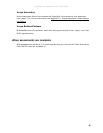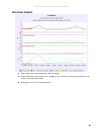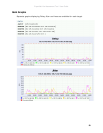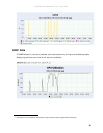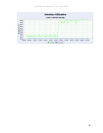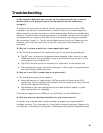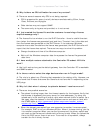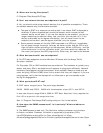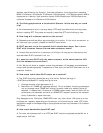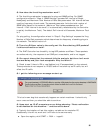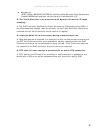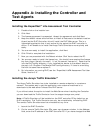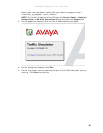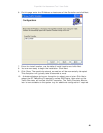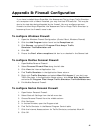ExpertNet Lite Assessment Tool - User Guide
34
Q: Where are the log files stored?
C:/Program Files/Avaya/ELAT/logs
Q: Can I use network devices as endpoints of a path?
A: No, you should avoid using network devices if at all possible as endpoints. There
are several reasons why this should be avoided:
● The goal of ELAT is to measure the entire path, from where ELAT is deployed to
where an IP phone hypothetically would be located, which include the last
network device on the path. If you use that device as the endpoint, you are no
longer measuring the devices' delay, loss, and jitter, but the path to it. If the
device is saturated on the egress interface(s), you will never know-it's the
endpoint and we don't use the egress interface, only the ingress.
● Some network devices will throttle ICMP responses to a UDP port unreachable,
but will pass-through the pings. Let's say we have a router and the CPU is at a
high utilization and we are using it as the edge host. We do a UDP ping - and the
router holds onto it until the utilization drops - and then sends the response. Or
the router just ignores the UDP ping entirely. Either way, the results are skewed.
Q: What devices should I use as endpoints?
A: For RTP tests endpoints must be Windowx XP boxes with the Avaya Traffic
Simulator installed.
For Ping tests, PCs or UNIX workstations are preferred. The hardware is typically very
stable, and many PCs or workstations will respond to pings quite efficiently. Network
hardware (listed above) should be avoided if at all possible. Newer printers may be
used, but ping (UDP and ICMP) them first to ensure that they will respond. If you are
using laptops, verify that the laptops will not hibernate or go into standby mode
during the engagement.
Q: What ports does ELAT use?
A: ELAT uses a range of ports. The ports range between:
24000 - 26000 and 27000 - 34000 with the exception of port 33711 and 33712.
It also uses the port range 2048 to 3389 for RTP Tests. Note that it only requires the
first 100 or so ports in this range to be free.
See: C:/Program Files/Avaya/ELAT/config/config.xml for further details.
Q: How does the SNMP access work? Is it read only? What variables are
retrieved?
A: The SNMP access is read-only. The Controller collects processor and interface
utilization variables. Processor utilization is supported by proprietary OIDs
(cpmCPUTotal5sec and busyPer for Cisco, a3sysCpuUtil for 3Com,
extremeCpuAggregateUtilization for Extreme, genCpuAverageUtilization for new Cajun



